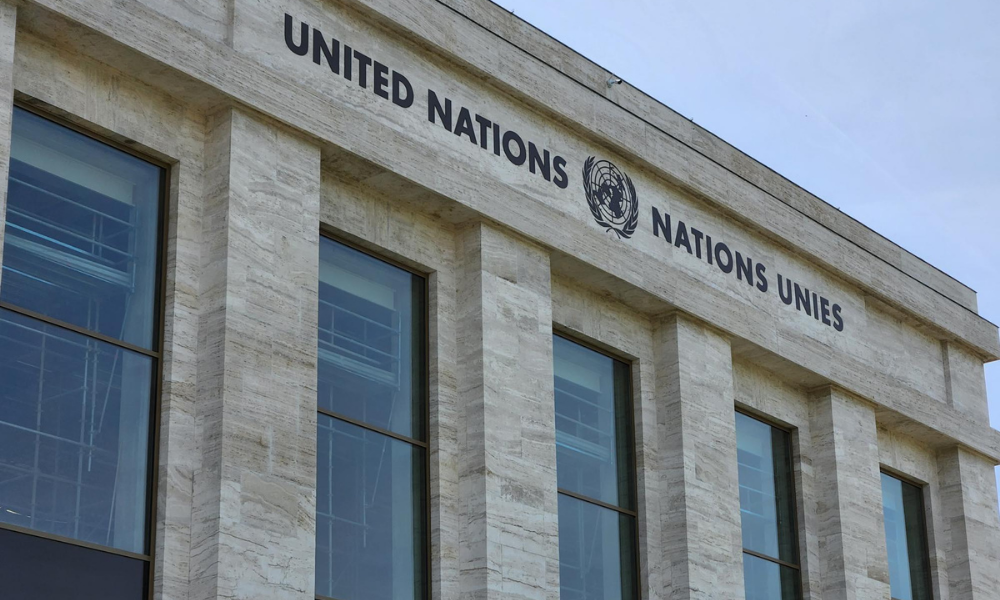Canada appeared this week at the 90th session of the UN Committee on the Rights of the Child

In a cyclical United Nations review of Canada’s treatment of Children, advocates brought the issues of nutrition, food-advertising laws and Indigenous housing initiatives to Geneva, Switzerland, and the UN committee asked Canada about its laws relating to corporal punishment.
Canadian officials participated in the 90th session of the Committee on the Rights of the Child on Tuesday and Wednesday. The delegation was in attendance to answer questions on its latest periodic report, submitted in accordance with s. 44 of the Convention on the Rights of the Child, which Canada ratified in 1991.
Bill Jeffery was also in attendance in Geneva. He is a lawyer, public-health-law-reform advocate, and the founder of the Centre for Health Science and Law. Jeffery’s organization asked the committee to analyse Canada’s actions on several health-related issues impacting children.
Among Jeffery’s concerns are Canadian laws around advertising directed at children under the age of 13, something which is prohibited in Quebec.
“We have been, for many years, urging that the federal government use its federal legislative powers to extend that restriction nationally by amending the Competition Act and the Food and Drugs Act,” says Jeffery.
Liberal Member of Parliament Patricia Lattanzio recently introduced a private members’ bill to prohibit food-and-beverage marketing directed toward children under the age of 13. Bill C-252 is currently in second reading in the House of Commons.
But Jeffery says the proposed legislation, which restricts advertising of foods high in saturated fat, sugar and salt, “contains loopholes that are so broad that most of the advertising directed at children would continue.” He adds that “there's zero protection for children aged 13 to 18.”
“That's a pretty major part of childhood and that's where a lot of the commercial advertising energy and funding is directed.”
The Centre for Health Science and Law has also asked the Committee to press Canadian officials about their plans for a promised national school food program.
The Liberal’s 2021 election platform pledged $1 billion over five years to help implement plans across Canada, and the 2022 budget similarly committed to working with governments and stakeholders towards a national school food policy. But Jeffery says the feds have yet to devote any funds to a plan. “We're concerned that it's just going to continue to be unfulfilled promises.” He adds that in implementing a plan, the government should ensure there are conflict-of-interest protections.
Catherine Lafferty is co-chair of the Indigenous Housing Working Group for Keepers of the Circle, and she was in attendance in Geneva as part of her organization’s advocacy toward better housing initiatives in Canada.
Her group’s message is “land back, land restitution and self-determination of Indigenous people,” she says. “We really focus on the holistic healing of Indigenous communities and families and having them make decisions for themselves without the shadows of institutionalization that are invested in surveilling and dictating how Indigenous people live in so-called Canada.”
“This particularly relates to Indigenous children in housing,” says Lafferty.
She says Canada needs to pay special attention to how it can keep children with their families, “in kinship and community,” and enable families to take care of their children rather than segregating or separating them through child apprehension. “We see that happening because of poverty, and housing insecurity. That's why we're here in Geneva to try to raise awareness around that.”
Lafferty was pleased to see much discussion between the UN committee members and the Canadian delegation on housing. But she says there is a lot of work to be done to ensure funding reaches remote Indigenous communities in the northern part of Canada.
There were also discussions around the Truth and Reconciliation Commission, Missing and Murdered Indigenous Women and Girls, Jordan’s principle and Bill C-92. Jordan’s Principle is a policy which ensures Indigenous children, on and off reserve, have equitable access to government-funded services, and Bill C-92 is federal legislation which affirms and recognizes Indigenous jurisdiction over child and family services in their communities. Bill C-92 received Royal Assent in 2019.
“Indigenous-led housing initiatives can help to tackle all of those government supported programs and policies,” says Lafferty. “And I think the government needs to make sure that they're not siloing all of these different categories that Indigenous-led housing can find solutions to.”
The UN committee also asked the Canadian representatives about violence against children.
Ron Ensom watched the proceedings from home, in Ottawa. For 20 years, he co-led the child abuse program at Children’s Hospital of Eastern Ontario (CHEO) and he is a clinician, researcher and advocate against corporal punishment and the physical abuse of children.
According to a recap from the UN High Commissioner on Human Rights, the committee asked why Canada was not willing to prohibit corporal punishment, and what bearing the 2004 Supreme Court of Canada decision in Canadian Foundation for Children, Youth and the Law v. Canada (Attorney General) had on the issue. The SCC ruling upheld the constitutionality of s. 43 of the Criminal Code, which states that parents or teachers are “justified in using force” against children, “if the force does not exceed what is reasonable under the circumstances.”
Corporal punishment is among the most common forms of violence children experience and “the greatest source of preventable harm of children around the world,” says Ensom. Section 43 is a primary driver of that harm, he says.
To curb child abuse in Canada, Ensom recommends “sustained public health education,” similar to that geared toward seatbelts, second-hand smoke and ultra-violet-ray protection. The other necessary action is to repeal s. 43, he says.
Ensom adds that in other jurisdictions, in which governments have repealed similar statutes providing defence for corporal punishment, the change in parental behaviour has been “dramatic.”










